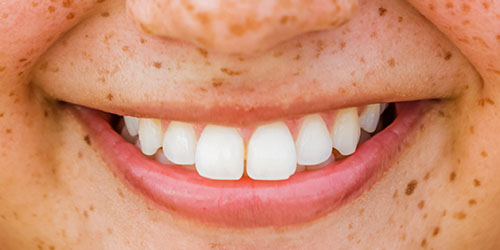At the Smile Center of Peoria, we welcome patients of all ages for regular check-ups and routine cleaning services.
Routine Dental Cleaning & Exams
Many patients assume that if their teeth look good and feel great, they don’t need routine dental cleaning appointments. The truth is that even patients who are exceptionally diligent about brushing and flossing require professional dental cleanings every six months.
We use modern dental cleanings remove plaque and tartar that your toothbrush or floss can’t reach or clean. This helps prevent tooth decay, gum disease, bad breath, and other dental complications. In fact, regular dental care can reduce the risk for several other severe conditions, including diabetes and high blood pressure.
Deep Cleaning
A deep cleaning is needed when there is a large amount of tartar and bacteria under the gums. This occurs when there is a deeper space between the teeth and gums, called a “pocket.” Pockets can develop when a person has not had their teeth professionally cleaned for a long period of time or when the person does not brush and floss on a regular basis.
Deep cleaning is also known as scaling and root planing. Scaling involves removing plaque and tartar from the surface of the teeth and from the pocket area between the teeth and gums. The other part of deep cleaning is root planing. A scaling instrument is used to remove plaque and tartar from the surface of the roots of your teeth. Scaling and root planing can be performed on one or two quadrants (quarter) of the mouth at a time, or the entire mouth can be treated in one visit, depending upon the diagnosis and our recommendation.
Dental Sealants
Many children, teenagers, and adults have difficulty cleaning their back teeth. It can be difficult to reach every surface of the molars with a toothbrush, and some individuals may not be able to reach their back teeth with floss. Over time, the lack of good oral hygiene on the back teeth can lead to tooth decay and cavities. Dental sealants can help prevent these problems by sealing the chewing surfaces.
For the best possible results, children should get sealants as soon as their molars have erupted because new teeth do not have any dental decay. Dentists recommend that children between the ages of six and 14 get dental sealants to help prevent cavities. It is important to note that older teenagers and adults can also get sealants if their molars are in good condition, meaning that the teeth do not have any signs of decay, dental fillings, or previous dental work.
Oral Cancer Screenings
Oral cancer is a serious health threat that affects over forty thousand Americans a year and kills over half of its victims within five years. At the Smile Center of Peoria, we want to make sure that our patients are as protected as possible from the devastating effects of mouth cancer.
These symptoms do not necessarily mean that you have mouth cancer, but if you are experiencing them, make an appointment for an oral cancer screening as soon as you can. We recommend that our patients come into our office for an oral cancer screening at least once a year as part of our general dentistry services.
The following symptoms all may be indicators of oral cancer:
- Mouth sores that heal very slowly
- White or reddish patches in the mouth
- Jaw or tongue pain
- Loose teeth or ill-fitting dentures
- Difficulty eating or swallowing
- A throat that feels sore all the time
- The feeling that something is caught in your throat all the time
Night Guards
While we are known for our smile transformations, we are also focused on protecting your teeth from damage. Teeth grinding (also known as bruxism) at night is a common problem that causes damage to your teeth, gums, and jaw. While the most visible sign of damage occurs on the surface of the teeth, nocturnal bruxism can also cause headaches, tooth pain, inflammation, and pain in your jaw and neck.
At the Smile Center of Peoria, we offer custom night guards that can protect your mouth while you sleep. Custom night guards are made from high-quality materials utilizing state-of-the-art technology to fit you comfortably and prevent damage from teeth grinding and jaw clenching, helping you to achieve a better night’s sleep. Learn more about custom night guards at the Smile Center of Peoria by scheduling an appointment at your local MINT dentistry office.
Emergency Treatment
We offer Emergency Dental Treatments during our regular business hours. You should seek immediate dental care if you are experiencing severe pain or any of the following has occurred:
- Injury to the gums or teeth: Injuries to the gums or teeth should not be ignored, especially if you are experiencing severe pain that cannot be managed with over-the-counter pain medication.
- Infections: Infections that are left untreated can lead to serious dental and overall health problems.
- Chips or fractures to teeth: Any chips or fractures to your teeth be treated immediately so that the pulp of the tooth can be protected.
- Lost fillings or crowns
If a tooth has been knocked out it must be re-implanted in the tooth socket quickly. Every second a tooth is dislodged, cells on the tooth’s root die. You have fewer than two hours to have a tooth successfully re-implanted. Seek emergency care from an endodontist or an emergency dentist within 30 minutes to attempt to save the tooth. Do the following: 1. Rinse the tooth with water. Do not dry or scrub the tooth. 2. Reposition the knocked-out tooth in the tooth’s socket, and carefully and gently push it into place with your clean fingers. If the tooth will not stay in place, put it in water or milk, or tuck it next to your cheek.
Special Needs
Providing comprehensive preventive and therapeutic dental care to patients who have special healthcare needs is an important aspect of our practice. We value the unique qualities of each smile we treat, and seek to ensure maximal health for all, regardless of developmental disability or other healthcare issues.
The American Academy of Pediatric Dentistry defines special healthcare needs as “any physical, developmental, mental, sensory, behavioral, cognitive, or emotional impairment or limiting condition that requires medical management, healthcare intervention, and/or use of specialized services or programs.” Whether your condition is congenital, developmental, or the result of disease or trauma, we can provide guidance and raise awareness of his or her special dental care needs.
Dental care for patients with special needs requires specialized knowledge acquired by additional training, as well as increased awareness and attention, adaptation, and accommodative measures beyond routine treatment. At our office, we have the experience necessary to provide suitable dental care while keeping in mind the unique nature of the patients we see.
Dentures
Dentures are custom-made to replace missing teeth. Dentures can either be made to be full (all teeth on the top or bottom of the mouth) or partial (connects to existing teeth to fill a space).
It can take time before your dentures are actually placed. At times, decaying teeth may need to be pulled. If any teeth are pulled, your mouth and gums will need time to heal before dentures can be made. The material used in your dentures depends on if you need full or partial dentures.
Full dentures are made of acrylic to comfortably fit your gums. The base of the denture either covers the roof of your mouth (top dentures) or is U-shaped (bottom dentures). Partial dentures have an acrylic base with a metal support. Partial dentures can hook to nearby teeth, which may need crowns to assist in attachment of the dentures.
Dentures may need to be refitted over time due to wear and gum and bone changes. Professional cleanings and dental visits are recommended to ensure your dentures are still working properly to support your smile.
Oral Surgery
Oral surgery encompasses many procedures that are done by an oral and maxillofacial surgeon. Surgeries of the face, jaw, or the hard or soft tissues in the mouth or jaws and face are all considered oral surgery.
Oral surgeries include:
- Wisdom teeth removal (dentoalveolar surgery)
- Tooth extraction (dentoalveolar surgery)






